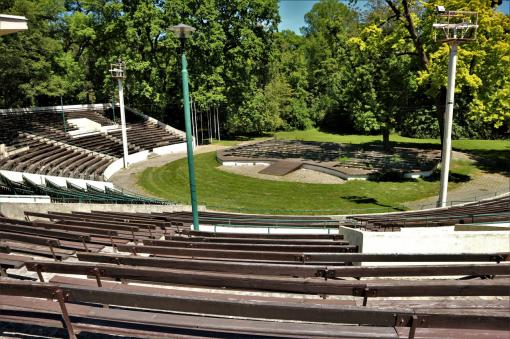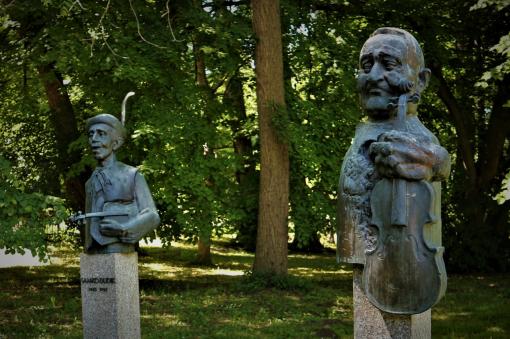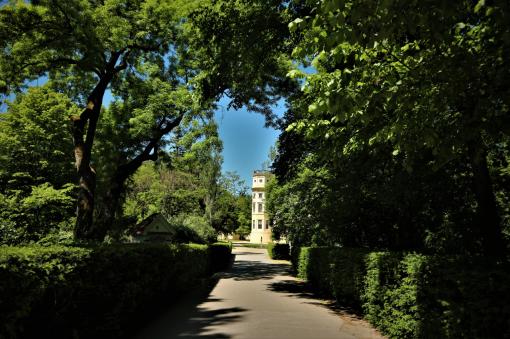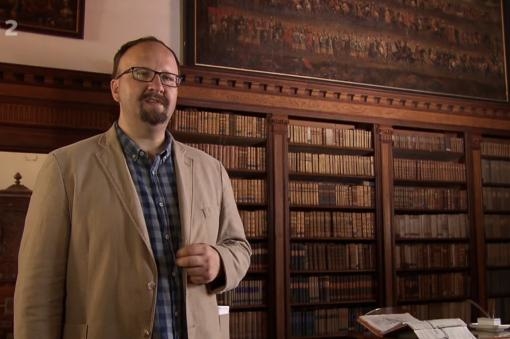After Easter, an official statement that ruined every folklore lover's day appeared on social networks and in the media. The folklore festival in Strážnice will not take place this year. The reasons are well known to everyone. Yesterday, another wave of coronavirus lockdown easement began, and this was not the only reason why we talked to Martin Šimša, director of the National Institute of Folk Culture (NÚLK) in Strážnice. Well, is there really a reason for mourning? What can we look forward to in the immediate future? And when is the best time to visit the castle park and the open-air museum in Strážnice? These questions, and not only these, will be answered in the following interview.
This year, together with the organisers, you were forced to cancel the largest domestic folklore festival in Strážnice. What were the most important circumstances that eventually led you to this unfortunate decision?
The last straw was that we had to settle with the foreign ensembles. Although the ministry's instructions were not unequivocal, it was obvious from the circumstances of the development of the pandemic around the world that we would not be able to carry out the festival in its full extent. Foreign ensembles really needed to know already in February whether the festival would take place. Hence, if we guarantee that if they buy tickets and the festival eventually does not take place, we will refund their tickets. Which was, of course, with the distances that they fly and with so many people involved, is completely out of our financial options. So we were forced to tell people abroad not to buy the tickets, as the festival simply would not take place. Then it was basically just about waiting for the right time to come to make this statement. It was high time after Easter, especially for the partners. Lots of craftsmen go to the festival, a lot of vendors. They all needed to set a schedule for this year. After Easter, it seemed obvious to us that even if the lockdown easement came, it would not apply to a congregation of thirty thousand people from all over the country.
Which foreign ensembles were affected this year?
We had arranged for an ensemble from Chile, which was very interested in participating. Another formation was supposed to arrive from Indonesia. These are really long distances. Ensembles from Europe, Serbia and Ukraine were also scheduled. It's always a mixture. We hope that everyone will stay loyal to us and come next year.

The 75th season of the festival was supposed to take place this year. Has it ever happened in the past that the festival did not take place?
This has never happened in the past. The festival is usually staged before the main school holidays, and that is why not even the year 1968 and the invasion of the Warsaw Pact troops affected it in any way. Also the year after, 1969, the festival took place as usual – simply speaking, it had never been cancelled. But everything once happens for the first time.
How will it be with the programme for the next season? Will it be new, or you will try to stick to the programme of this year?
Yes, we would certainly like this year's programme to take place as much as possible next year. This is because programmes are not planned from year to year. They are always being prepared several years in advance, ensembles are arranged, the authors prepare everything, new choreographies are made. That is why we don't want this big effort, which is related to everything, to go to waste. There's actually no reason for the shows not to be staged.
For example, don't you have older performers in some shows, for whom this could be a problem?
They certainly are there, but no programme is built specifically on them, so this is not a problem.

Are you planning on any special sanitation measures for the coming years?
This will become apparent depending on the sanitation measures put in place in general. Of course, you can set limits, but everyone behaves according to his or her own manners. It's hard to command a mass of people to behave in a certain way, to wear face masks or not to drink alcohol.
Are you planning on any other novelties or changes? I know, for example, that the sale of tickets has been discussed...
Last year we already managed to introduce a system of advanced sales, but eventually it turned out that there was not so much interest in using it. Maybe it was because it started about three weeks prior to the festival, which is quite a short time. If everything had been launched right after the New Year, it would probably be more interesting for people. We have a bit of a problem with the fact that we are VAT payers, and that is why we have to sell every ticket in the month in which it is accounted for. Hence, selling something in January that will be fulfilled in July is a problem. That is why I don't know yet how everything will work in the future. Of course, there is the option to sell tickets for example through the Ticketportal, but there we would have to share our profit, which is rather small every year, with the service provider.
There might be a problem with returned tickets this year...
Yes, in a way there might be. Due to the fact that the festival is and has always been basically loss-making, our financial loss deriving from its cancellation is not nearly as great as is the case with other commercial festivals.

An integral part of the Strážnice festival is also Skanzen, an open air folklore museum. I suppose it is also closed to the public? When will it be open?
The Skanzen will open on Tuesday 26 May. So far, we have had to cancel the Easter events, which fell right into the beginning of the coronavirus lockdown. We also cancelled the erection of the maypole. It was during this period that a number of programmes for schools were supposed to take place. Quite logically, we had to cancel them as well. For the school holidays, if it really happens that it will be allowed for one thousand people to congregate, three programmes could be taken into consideration. However, we will see at the end of June how everything will develop. We would like to organise the harvest festival, the pilgrimage in the Skanzen open-air museum and the Firefighters' Sunday. So we will work on these, but their actual holding will depend on the overall situation. We assume that this week everything will be very slow, because school trips are not coming, nor are senior citizens' package tours. It will be more focused on weekend operation. The core of the weekend operations are guided tours, during which visitors will move around the area individually. Guides who will give explanations and demonstrate handicraft activities will be placed in selected buildings. In addition, there will be guided tours, but smaller than they used to be. They will not be for forty people, but only twenty. We will require that all visitors have a face mask with them when entering the complex. Of course, they don't have to keep it on their mouth all the time, but when entering buildings that aren't really big and where it's not possible to keep the two-metre social distancing in them, they'll have to put the masks on.
And what are you planning for the period in which the festival was supposed to be held? Can visitors look forward to some replacement programme, such as streaming or perhaps something similarly popular these days?
Thanks to cooperation with a group of enthusiasts who now have the ifolklor brand, we put together a virtual version for the festival, which will be called "ifolklorní Strážnice". It will have several levels. One of them is the mentioned level of streaming. We addressed a number of ensembles, choirs, bands and individuals. We challenged them to record a short half-hour stream in which they would present what they would normally like to show at Strážnice and how they would enjoy it. They make the recordings at their homes so that they don't have to come to Strážnice, because we are afraid that a lot of people will want to see what it looks like here, what's going on here. What are we going to do here with such a small Woodstock that we can't manage, either organisationally or hygienically? Because people will want to go to the toilet, drink water, buy food. But now the park is running only in the normal visitor mode, which is meant for about a hundred people, not thousands. So our keywords are "stay at home!" Stage Strážnice in your favourite home nest and we will provide you with streams on our Facebook page. There will be performances by ensembles and dulcimer bands interspersed with historical records from the archives, both photographs and videos of older programmes. That will be one level. The other level is in cooperation with TV Noe from Ostrava; at prime times on Friday, Saturday and Sunday afternoon, shows that have been acclaimed by spectators in the past will be available for viewing. Cooperation with Czech Radio and Radio Proglas is also anticipated.
Who can folklore enthusiasts look forward to?
It is agreed with a number of ensembles from Moravian Slovakia, the Brno district, Bohemia or northern Moravia. There will be plenty of it. The programme is expected to run on Friday, Saturday and Sunday.
Finally, do you have a message that you would like to convey to the readers of our portal Brno – City of Music?
Well, I would like to invite all our visitors to approach Strážnice this year in the same way as they are used to watching big sport shows, such as a hockey match or the Olympics together, whether in their favourite garden, at home or in a pub. To find their favorite place, invited friends there, get good wine and food. And to watch this year's festival in Strážnice on Facebook or the TV with similar excitement. And next year we will hopefully welcome them all right here again.
































No comment added yet..